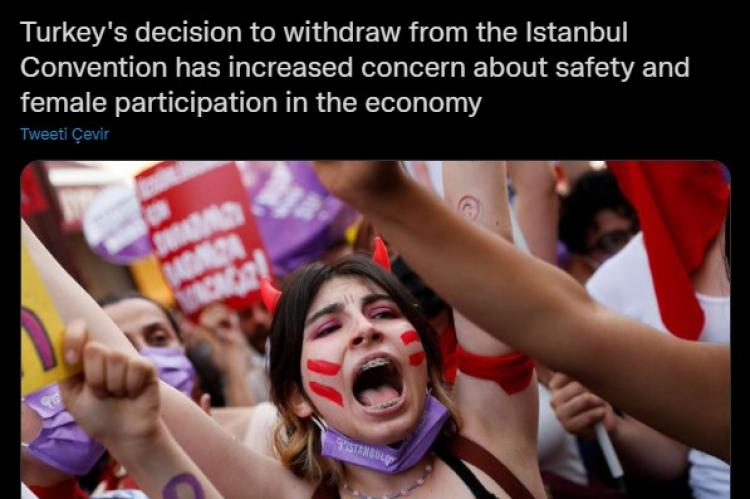Are all women really safe under the Istanbul Convention?
An article published by Bloomberg Businessweek[1] has claimed that Turkey's decision to withdraw from the Istanbul Convention raises concerns about women's participation in the economy and security. According to the latest data shared by TUIK (Turkish Statistical Institute), there are 41.7 million women in Turkey[2]. Looking at the content of Bloomberg’s article, two women in Turkey support the claim. It is transformed into political propaganda by creating the perception that all women in Turkey are experiencing this anxiety or will experience it in the future because of the annulment of the Istanbul Conversation. Unfortunately, violence against women did not stop with the convention; nor did it increase when the convention ended.The convention was signed by the Council of Europe in Istanbul, Turkey's most developed city, about ten years ago. In 2012, Turkey became the first country to ratify the convention. Albania, Austria, Bosnia, Denmark, Italy, Montenegro, Portugal, Serbia, Spain and Turkey were the countries where the convention came into effect the earliest. The European Union signed the convention on 13 June 2017.
On the other hand, some member states of the Council of Europe that signed the Istanbul Convention did not actually ratify the convention and put it into practice, while two others, Russia and Azerbaijan, have not even signed it. In addition, violence and harassment have not decreased in any of the countries that have signed and ratified the convention. Those who interpret Turkey's withdrawal from the Istanbul Convention as anachronistic and claim that only Turkey has withdrawn from this agreement know very well that this controversial agreement did not even pass through the parliaments of many European countries! Some countries rejected the convention because of fears that it would disrupt the family structure. For instance, Slovakia, Hungary, Poland, and the UK all refused to ratify the convention and withdrew from it, while others took steps to withdraw after ratifying it. France and Germany annotated the contract. Croatia now also wants to withdraw from the contract.
It is clear that we do not need the Istanbul Convention to guarantee women's rights. Turkey already has the power to protect women's rights with its laws and constitutional regulations. The essential thing in this matter is not the convention, but our own laws and regulations. The most important aim of the work carried out for women since 2003 has been to strengthen and protect women and their families. The Law on Protection of Family and Prevention of Violence Against Women, the establishment of family courts, the establishment of the Violence Against Women Research Commission, the establishment of Violence Prevention and Monitoring Centers (VPMC), Legal Support and Victim in 105 courthouses where women can get help in case of emergency. It is now considered a crime. The government has removed distinctions such as woman-girl and celibate-virgin from the Constitution, while derogatory concepts such as “forcible rape”, “attempted rape”, and “harassment” have been abolished. Sexual intercourse using force in marriage has been criminalized, and criminal sanctions are now imposed on perpetrators of femicide. Increasing the number of perpetrators in honour killings and removing the discount for the perpetrator are just some of these studies.
A new convention called the Ankara Consensus has been put forward on this subject. This new study aims to reject all forms of violence and prevent its normalization. With the Ankara Agreement, violence against women, men, children, the elderly, animals, and plants – in short, all kinds of violence – will be combated. The internationally binding Istanbul Convention was not sufficient to prevent honour killings or domestic violence in Turkey. But most women and charities believed it was necessary for the country. Focusing on the Turkish economy, where women make up one third of the total workforce, Assoc. Dr Gökçe Uysal claims that withdrawing from the contract is risky for women. For example, he thinks the dynamics may change in some conservative families that take a stand against the principle of women working outside the home. "If husbands do not want their wives to work, some women may prefer to stay at home to avoid the possibility of domestic violence," said Uysal, Associate Professor of Economics. Claiming that women can choose not to work to avoid violence from their spouses, Uysal shows that by taking the Istanbul Convention to the root of all problems, it put the real causes of grievances under the guise of termination. However, in the period during which the convention was in force, such grievances, though they were reduced by the measures taken by the state, were unfortunately never ended. In other words, the issue is not related to the Istanbul Convention.
[1] https://www.bloomberg.com/news/articles/2021-09-08/turkey-leaves-istanbu...
[2] https://data.tuik.gov.tr/Bulten/Index?p=Women-in-Statistics-2021-37221



